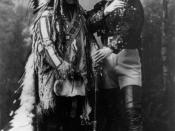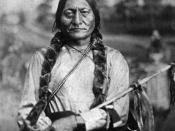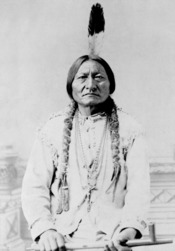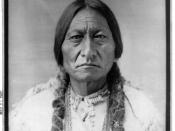During the nineteenth century, Lakota culture took a drastic change. With the "whites" settling all across the U.S. it made hard times for the Indians. White settlers tried to force Indians out of their lands with treaties and when that didn't work they resorted to combat. The Indians lost many battles mostly due to being outnumbered by the white settlers. Indians also contracted many diseases from the white settlers that the Indians could not cure.
The traditional Lakota style of fighting was of the usual fashion; each man for himself, each striving for deeds of bravery and the coups that added to war honors. This highlighted bravery, fortitude, generosity, and wisdom. This style of fighting, however, was not as productive as it was with other Indian tribes. Many times Sitting Bull was outnumbered and did not have the firepower that the white settlers used.
Sitting Bull's three personalities consisted of superlative warrior and huntsman, holy man, and good tribesman.
Sitting Bull was the person that everybody admired. Many people looked up to him and was considered by many a role model. Sitting Bull did not let the white settlers just take his land. Never did he go out without a fight. Red Cloud, however, surrendered early and was forced to live on a reservation. I admire Sitting Bull for his admiration of not letting white settlers just take his land.
Early Americans were interested in the Sioux territory because of the popular westward expansion and buffalo. Americans were surprised at Sitting Bull's resistance. Never did he not go out with a fight. He fought brave and hard in all of his battles. Sitting Bull, however, ended up losing his battles to the American government and was forced to sign The Treaty of 1868, which forced the Indians to live on a reservation.
Life on reservations for Indians was very harsh. Many Indians died from hunger and disease. That sounds harsh enough but then they were also forced to embrace Christianity, Americanism, and the customs and values of the white people. The Ghost Dance is significant because many Indians participated in it even though Americans outlawed it. It was a way of keeping Indians united. I believe Robert Utley is correct when he says, "Sitting Bull lost not because of any personal or cultural failings but because of forces beyond his control." I believe this to be correct because if Sitting Bull were able to go back in the past and change his battle routines, it would still be near impossible for him to win because he was so outnumbered by the American army.





![Sitting Bull's grave] / F.B. Fiske.](https://s.writework.com/uploads/11/119655/sitting-bull-s-grave-f-b-fiske-thumb.jpg)